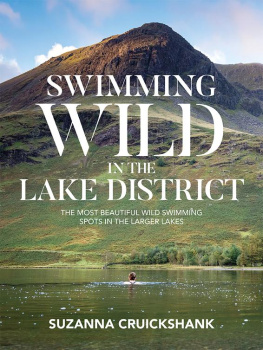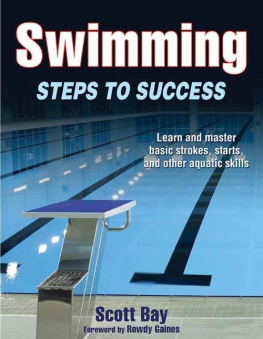Swim
Copyright 2012 by Lynn Sherr.
Published in the United States by PublicAffairs,
a Member of the Perseus Books Group
All rights reserved.
No part of this book may be reproduced in any manner whatsoever without written permission except in the case of brief quotations embodied in critical articles and reviews. For information, address PublicAffairs, 250 West 57th Street, Suite 1321, New York, NY 10107.
PublicAffairs books are available at special discounts for bulk purchases in the U.S. by corporations, institutions, and other organizations. For more information, please contact the Special Markets Department at the Perseus Books Group, 2300 Chestnut Street, Suite 200, Philadelphia, PA 19103, call (800) 810-4145, ext. 5000, or e-mail .
Book design by Pauline Brown
Library of Congress Cataloging-in-Publication Data
Sherr, Lynn.
Swim: why we love the water / Lynn Sherr.1st ed.
p. cm.
Includes bibliographical references and index.
ISBN 978-1-61039-047-7 (electronic) 1. SwimmingPsychological aspects. I. Title.
GV838.53.P75S44 2012
797.2'1019dc23
2011044527
First Edition
Contents

Ancient Roman provincial coin showing Leander swimming the Hellespont
T HE SEA surrounds me, a warm expanse of regal blue with gentle waves that barely stipple the surface. The calm is deceptive. I am trying to cut through a relentless cross-current with firm strokes of my own. Right arm, left arm, roll, breathe. The water lifts me; the land, another continent, seems distant. Relax, I tell myself. Youll make it.
This is the Hellespont, known today as the Dardanelles, the storied channel separating Europe from Asia in western Turkey. Geographically, I am moving from one continent to the other, a passage more sensibly traveled by boat or plane. Historically, I am swimming at the threshold of what was once the known world. Ahead of me, on the eastern shore, lie the ruins of Troy, site of the decade-long war recounted in Homers Iliad that first confirmed the horrors of battle, an epic fought 3,200 years ago. Behind me rest the memorials to the men of both sides who died in the brutal Gallipoli campaign of World War Ithe Swimmers War, its been called, for the innocents who bathed daily in the seas that soon ran red with their blood. These empty battlefields bracket centuries of conflicts over control of the waters that now buoy my body. Hittites, Mycenaeans, Greeks, Persians, Romans, Ottomans, Genoese, Venetians, Byzantines, Turks: all have ruled here. Achilles and Hector fought to the death for this fluid corridor; the Persian king Xerxes crossed it from Asia on a bridge of ships to invade the Greek settlements (after petulantly lashing the sea with whips when a storm destroyed his first attempt); Alexander the Great reversed direction to take them back. Jason sailed the Argo from here in search of the golden fleece; the fleece itself had swathed the flying ram on which Princess Helle escaped from her wicked stepmother. When Helle fell into this sea, it took her name: Sea of Helle, or Hellespont. History was transformed and empires crumbled in the wake of these mythic waters. The Hellespont has always been the route to something biggeranother conquest, another country, a new continent, a new adventure. And the legendary tale of tender new love.

Leander swims to Hero, waiting in her tower.
One summer evening, so long ago that the date has been lost, an energetic young fellow named Leander met a beautiful maiden named Hero and fell in loveat first sight, as the poet Christopher Marlowe later wrote, thus delivering a lasting definition of romance. She was a priestess of Aphrodite, a virgin destined to remain chaste in her tower at Sestos, on the Greek shore; he was a townie from Abydos, on the Asian side. No way, said the elders; these waters exist to keep you apart. Which is not the sort of thing young lovers like to hear. So every evening, our hero, Leander, leapt into the water and swam across for a night of secret romance with his hero, Hero. She hung a lantern to light his way; he arrived gasping and briny, rank with the smell of fish. A few drops of rose oil, and they fell into bed together. At dawn Leander slipped back into the Hellespont to swim home, undetected. One night, the fury of approaching winter roiled the winds into a storm, dousing Heros lamp. The sea spun, the waves roared, and Leander, unable to find his way, drowned. When his body washed ashore the next morning, Hero, overwhelmed with grief, jumped from her tower to join him in the afterlife. A double tragedy for this aquatic Romeo and Juliet. But their loss of life was folklores gain: the doomed lovers became the costars of the most famous swimming myth in Western lore.

Leander drowns, in time-lapse artistry, as Hero falls to join him.
The poet George Gordon, better known as Lord Byron, himself a master swimmer with a fascination for all things classically Greek, was intrigued. Could it have happened? Was it possible to swim across these rough waters? On a Mediterranean journey in 1810, he decided to find out. Enlisting an officer from the frigate to join him, Byron made the crossing on his second try, establishing the Hellespont as a romantic challenge and becoming the poster child for overachieving swimmers around the globe. His companion, Lieutenant William Ekenhead, beat him across by five minutes but disappeared from the record books after he drowned during a drunken celebration of his promotion to captain some time later. Byron, on the other hand, boasted endlessly about his accomplishment and put the Hellespont at the top of the list of waterways hed swum: Londons Thames, Venices Grand Canal, Switzerlands Lake Geneva. I plume myself on this achievement, he wrote to a friend, more than I could possibly do on any kind of glory, political, poetical, or rhetorical.
So what am I doing here on an August afternoon, 150 miles southwest of Istanbul, 5,000 miles from New York, my home? The Hellespont is a critical passageway, the final conduit of the unbroken flow from the Black Sea, south through the Bosporus and the Sea of Marmara on its way to the Aegean.
Nearly fifty thousand tankers and cargo ships funnel through here each year, one of the worlds busiest and swiftest freight lanes. Mind the currents, Ive been told, or I could get swept out toward Greece. Mind the critters, Ive been warned: stinging jellyfish and other natural enemies also swim here. But its lure is magnetic. I, too, am captivated by the classical world and have dusted off my college Greek to read up on the history; I, too, love to swim and am drawn by the passion of my predecessors. And at a stage of my life when I have more time to explore and mightier muscles to rely on, I, too, like a challenge and want to test my body and mind in these iconic waters. After years of tracing familiar routes at my own pace, what would it would be like to dip my toe into an alien ocean, to tackle a distance far beyond my longest laps? Will I find what blind Homer, writing some four hundred years after the Trojan War, called the riptide straits of the Hellespont or what Shakespeare (who never saw it either) dismissed as its easy current? Can I transfer years of paddling in perfect pools and lovely lakes and East Coast seashores to this wild strait dividing Europe and Asia? Can I, too, swim the Hellespont?
Next page










